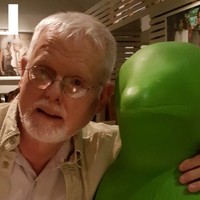Goto https://eastanglia.academia.edu/RupertRead - by Rupert Read
Papers by Rupert Read
Routledge eBooks, Oct 22, 2018
Self and society, Oct 2, 2017
The Philosophers’ Magazine, 2016
Journal of Philosophical Economics
This short paper is a note offering provisional results of my current research in philosophical e... more This short paper is a note offering provisional results of my current research in philosophical economics and the philosophy of economics. It is offered in the spirit of promoting discussion of an interesting topic worthy of further investigation.

ABSTRACT: I argue that the language of some schizo-phrenic persons is akin to the language of Ben... more ABSTRACT: I argue that the language of some schizo-phrenic persons is akin to the language of Benjy in Williams Faulkner’s novel The Sound and the Fury, in one crucial respect: Faulkner displays to us language that, ironically, cannot be translated or interpreted into sense... without irreducible ‘loss ’ or ‘garbling.’ The same is true of famous schizophrenic writers, such as Renee and Schreber. Such ‘garbling ’ is of an odd kind, admittedly: it is a garbling that inadvisably turns nonsense into sense.... Faulkner’s language is a language of paradox, of nonsense masquerading beau-tifully as sense. When this language works, it gener-ates the powerful illusion that we can make sense of the ‘life-world ’ of a young child or an ‘idiot’—or a sufferer from chronic schizophrenia. But this remains, contrary to Louis Sass’s claims, an illusion. Thus, drawing on the thinking of Wittgenstein (his On Certainty, especially, with its incisive critique of the very idea of being able to make claims...
Quaker Religious Thought, 1995

We’ve gambled too much on succeeding in preventing or mitigating anthropogenic dangerous climate ... more We’ve gambled too much on succeeding in preventing or mitigating anthropogenic dangerous climate change and the anthropogenic extinction crisis. Because we were unwilling to face up to the alternative. But the alternative is not as simple as an instantaneous end of life would be. The alternative is complex, involving many possible variants of ‘unthinkably’ horrendous, bad, and even good. Most crucially: there is a huge difference between the various versions of complete irrecoverable societal collapse, on the one hand, and the rise of a successor civilisation(s) out of the wreckage of this one, on the other. We have to be willing to think this. And face it. We have to get serious about the processes of transformational and deep adaptation that are now necessary. We cannot any longer avoid the vast effort involved in attempting to adapt our communities to cope with our changed and changing world; not least because the time-lags built into the climate system mean that, even in the ext...
The Frontiers Collection, 2019
We examine the growing ‘Voluntary Simplicity’ (VS) movement from the perspectives of Utilitariani... more We examine the growing ‘Voluntary Simplicity’ (VS) movement from the perspectives of Utilitarianism, Kantian deontology, and Virtue Ethics. We argue that, from each of these three diverse perspectives, there is a compelling argument to the conclusion that citizens of the ‘developed’ world ought to embrace such simplicity in their own lives, and to facilitate its greater adoption societally and globally. We conclude by asking why it is that this compelling conclusion has not already been more widely found and acted upon. In reflecting on this question we outline some arguments for why a culture of voluntary simplicity may be needed to drive political and macroeconomic change.
Theory and History in the Human and Social Sciences, 2019

Nordic Wittgenstein Review, 2019
Finlayson argues that ‘post-truth’ is nothing new. In this response, I motivate a more modest pos... more Finlayson argues that ‘post-truth’ is nothing new. In this response, I motivate a more modest position: that it is something new, to some extent, albeit neither radically new nor brand new. I motivate this position by examining the case of climate-change-denial, called by some post-truth before 'post-truth'. I examine here the (over-determined) nature of climate-denial. What precisely are its attractions?; How do they manage to outweigh its glaring, potentially-catastrophic downsides? I argue that the most crucial of all attractions of climate-denial is that it involves the denier in a kind of fantasised power over reality itself: namely, over the nature of our planetary system, and thus of life itself. Climate-denial pretends to give the denier a power greater than that of nature, including in nature's 'rebellion' against humanity, what James Lovelock calls Gaia's incipient and coming 'fever'. Climate-denial seems to give the denier freedom from trut...
Philosophical Investigations, 2019
In this article, we analyse one of the most famous recent thought‐experiments in philosophy, name... more In this article, we analyse one of the most famous recent thought‐experiments in philosophy, namely Donald Davidson's Swampman. Engaging recent commentators on Davidson's Swampman as well as analysing the spatio‐temporal conditions of the thought‐experiment, we will show how the ‘experiment’ inevitably fails. For it doesn't take seriously some of its own defining characteristics: crucially, Swampman's creation of a sudden in a place distinct from Davidson's. Instead of denigrating philosophical thought‐experiments per se, our analysis points towards considering thought‐experiments in a different sense: imaginary scenarios helpfully self‐deconstructing rather than constituting substantive philosophical resources.
Environment: Science and Policy for Sustainable Development, 2017
Royal Institute of Philosophy Supplement, 2016
Environmental Ethics, 2015











Uploads
Goto https://eastanglia.academia.edu/RupertRead - by Rupert Read
Papers by Rupert Read